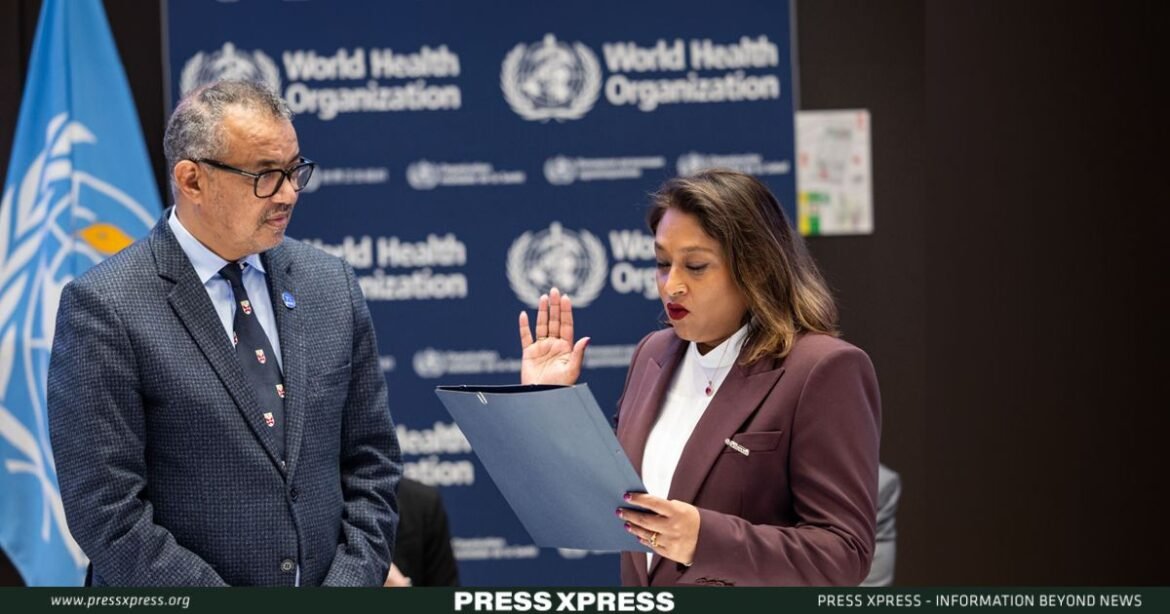Saima Wazed brings a visionary agenda focusing on mental health parity, women’s and children’s well-being, and leveraging technology
Saima Wazed is set to assume the role of Regional Director for Southeast Asia at the World Health Organization (WHO). Hailing from Bangladesh, she makes history as the first individual from the country and the second woman to hold this position in the WHO South-East Asia Region. Her official term begins on February 1, succeeding the current director, Dr. Poonam Khetrapal Singh. The appointment, spanning the next five years, was confirmed by the World Health Organization. Dr. Poonam Khetrapal Singh will continue in her role until January 31.
You can also read: Saima Wazed Promotes Commonwealth Cooperation for Climate Challenges
The WHO’s press release outlined that the 154th Executive Board meeting for the South-East Asia region commenced on January 22 and will extend until January 27. Following the conclusion of this meeting, Saima Wazed will assume her responsibilities as the new Regional Director. Notably, she secured the position on November 1, 2023, during the regional conference in New Delhi, India, with an 8-2 majority vote.

‘I would like to thank the Member States for the trust they have placed in me. There is a lot of work to be done, and I am extremely pleased to be starting this journey at this moment with all of you. I am excited for all that we can, and will, do together in the coming years.’
– Saima Wazed
New Regional Director’s Priority Areas of Function
The new Regional Director, upon taking oath, outlined her key priorities:
- Firstly, she emphasized a strong focus on mental health, aiming to address its long-neglected status and achieve parity with physical health in healthcare systems.
- Secondly, she plans to implement specific interventions for women, children, and pregnant women, incorporating education, empowerment, and prevention with a life-course approach.
- Thirdly, she highlighted the potential of technology in public health, citing innovations in telemedicine, remote monitoring, data-driven diagnostics, and personalized treatment plans.
“I look forward to devising and implementing specific interventions for women and children, including pregnant women. This will be created with education, empowerment, and prevention in mind. Structured with a life-course approach, this will include comprehensive well-being and health screenings, vaccination and nutrition programs, promotion of both physical and mental well-being, and resilience,”
– Saima Wazed
The newly elected Director stressed the multi-generational impacts of success in these areas, affecting societal, social, and economic health. Other priorities include; universal health coverage, emergency response, and pandemic preparedness, collaboration with various sectors, monitoring and progress reporting, addressing climate change impacts, and focusing on marginalized and vulnerable groups. Transparency, sustainability, and partnership were underscored in financing efforts.
South-East Asia Region of WHO
Collaborating with 194 Member States spanning 6 regions and operating in over 150 locations worldwide, the WHO team strives to enhance the well-being and health of all individuals. Within the WHO South-East Asia Region, which comprises one of the six WHO Regions, more than a quarter of the global population resides.
The South-East Asia Region of the World Health Organization consists of 11 Member States:

Country offices for WHO are established in each of these 11 Member States, with the regional office situated in New Delhi, India.
South-East Asia Region’s Function of WHO
WHO is dedicated to forging a healthier future for the nearly two billion individuals within this Region, collaborating with its 11 Member States to confront persistent and emerging epidemiological and demographic challenges. Given the susceptibility of the Region to natural disasters, disease outbreaks, and health risks associated with climate change, a paramount focus for WHO involves enhancing emergency risk management to support sustainable development.
Emphasizing the pursuit of universal health coverage and the fortification of robust health systems, WHO identifies these as crucial priorities.

Aligned with WHO’s global triple billion goals and the UN Sustainable Development Goals, the Region has established eight flagship priority programs. Such as;
- Measles and rubella elimination
- Preventing non-communicable diseases
- Reducing maternal, under-five, and neonatal mortality
- Universal health coverage with a focus on human resources for health and essential medicines
- Combating antimicrobial resistance
- Scaling up capacities for emergency risk management
- Eliminating neglected tropical diseases and
- Accelerating efforts to end TB.
Saima Wazed’s Impressive Achievements
Saima Wazed, daughter of Bangladesh Prime Minister Sheikh Hasina and granddaughter of Father of the Nation Bangabandhu Sheikh Mujibur Rahman, with a Bachelor’s degree from Barry University in Florida, USA, and a master’s degree in clinical psychology, is currently pursuing a doctorate in Organizational Leadership from the same institution. From 2014 onward, she has been a part of the WHO’s Expert Advisory Panel on Mental Health. Additionally, she has been serving as an Advisor to the WHO Director-General on Mental Health and Autism since 2019.
In 2017, She was appointed as the Goodwill Ambassador for Autism in WHO South-East Asia and played a pivotal role in co-authoring the WHO South-East Asia Regional Strategy on Autism Spectrum Disorder. Additionally, she holds the position of Associate Fellow at the Global Health Program Chatham House, UK, and serves as the Chairperson of the National Advisory Committee on Autism and NDDs in Dhaka, Bangladesh. She is also the Chairperson of the Shuchona Foundation in Dhaka, Bangladesh.
Recognized for her outstanding contributions, Saima Wazed received the ‘Excellence in Public Health’ award from the WHO South-East Asia Regional Office in 2014 and the Ibrahim Memorial Gold Medal in 2016 from the Dr. Ibrahim Memorial Council, Bangladesh. In 2017, she was honored with the International Champion Award by the US organization Shema Kolainu for her impactful work on autism in Southeast Asia. Furthermore, in 2019, Saima Wazed was conferred the Innovative Women Leaders in Global Mental Health award by the Global Mental Health Programs at Columbia University, USA.
Her exceptional track record and awards reflect a commitment to global health and make her a formidable leader for the challenges ahead.


